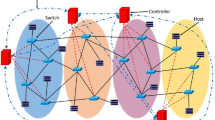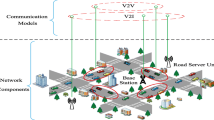Abstract
Due to the massive deployment of mobile terminal equipment in the multi-access edge computing environment, user terminals will frequently handover between different base stations, resulting in problems such as reduced device response speed and increased performance loss. In light of the foregoing, this study presents a method for terminal equipment in the MEC environment to execute adaptive handover between wireless access points. To achieve elastic and dynamic network resource management and minimize the load index, an adaptive handover model based on traffic perception is proposed. Then, the adaptive handover algorithm based on AP weight is used to calculate the AP with the highest weight, and the network state is centrally controlled and monitored in real time by software-defined network controller. Then, a multi-factor joint resource management method based on SDN is proposed to reduce the delay caused by computing task offloading. This includes a resource allocation model based on minimizing communication, computing, and energy consumption performance established, and the optimal values of task offloading decision and resource allocation vector calculated through the greedy strategy. The suggested technique may successfully increase system reaction speed and task offloading loss, according to the experimental findings.
















Similar content being viewed by others
References
Abbas N, Zhang Y, Amir T et al (2018) Mobile edge computing: a survey. IEEE Internet Things J 5(1):450–465
Yuyi M, Changcheng Y, Jun Z et al (2017) A survey on mobile edge computing: the communication perspective. IEEE Commun Surv Tutor 19(4):2322–2358
Baktir AC, Ozgovde A, Ersoy C (2017) How can edge computing benefit from software-defined networking: a survey, use cases, and future directions. IEEE Commun Surv Tutor 19(4):2359–2391
Wang X, Wang K, Wu S et al (2018) Dynamic resource scheduling in mobile edge cloud with cloud radio access network. IEEE Trans Parallel Distrib Syst 29(11):2429–2455
Amin R, Rojas E, Aqdus A, Ramzan S, Casillas-Perez D, Arco JM (2021) A survey on machine learning techniques for routing optimization in SDN. IEEE Access 9:104582–104611. https://doi.org/10.1109/ACCESS.2021.3099092
Li C, Song M, Zhang M, Luo Y (2020) Effective replica management for improving reliability and availability in edge-cloud computing environment. J Parallel Distrib Comput 143:107–128
Li C, Bai J, Yi C et al (2020) Resource and replica management strategy for optimizing financial cost and user experience in edge cloud computing system. Inform Sci 516:33–55
Li C, Song M, Yu C, Luo YL (2021) Mobility and marginal gain based content caching and placement for cooperative edge-cloud computing. Inform Sci 548:153–176
Wang Kehao Hu, Zhixin AQ et al (2020) Joint offloading and charge cost minimization in mobile edge computing. IEEE Open J Commun Soc 1:205–216
Huang PQ, Wang Y, Wang K et al (2019) A bilevel optimization approach for joint offloading decision and resource allocation in cooperative mobile edge computing. IEEE Trans Cybern 50(10):1–14
Na W, Jang S, Lee Y et al (2019) Frequency resource allocation and interference management in mobile edge computing for an internet of things system. IEEE Internet Things J 6(3):4910–4920
Wang F, Xing H, Xu J (2019) Optimal resource allocation for wireless powered mobile edge computing with dynamic task arrivals. In: ICC 2019–2019 IEEE International Conference on Communications (ICC). EEE Press, Shanghai. pp. 1–7
Gao Y, Zhou J (2019) Probabilistic caching mechanism based on software defined content centric network. In: 2019 IEEE 11th International Conference on Communication Software and Networks (ICCSN). IEEE Press, Chongqing. pp. 210–214
Subramanya T, Goratti L, Khan SN et al. (2017) SDEC: a platform for software defined mobile edge computing research and experimentation. In: 2017 IEEE Conference on Network Function Virtualization and Software Defined Networks (NFV-SDN). IEEE Press, Berlin. pp. 1–2
Shantharama P, Thyagaturu AS, Karakoc N et al (2018) LayBack: SDN management of multi-access edge computing (MEC) for network access services and radio resource sharing. IEEE Access 6:57545–57561
Kiran N, Yin C, Akram Z (2017) AP load balance based handover in software defined Wi Fi systems. In: IEEE International Conference on Network Infrastructure & Digital Content, IEEE
Wang S, Fan C, Hsu CH et al (2017) A vertical handoff method via self-selection decision tree for internet of vehicles. IEEE Syst J 10(3):1183–1192
Bin Ma, Dong W, Shuangguo C et al (2017) Modeling and analysis for vertical handoff based on the decision tree in a heterogeneous vehicle network. IEEE Access 5:8812–8824
Shidrokh G, Wan HH, Mohammad HA et al (2017) ABC-PSO for vertical handover in heterogeneous wireless networks. Neurocomputing 256(20):63–81
Bingtao Y, Xue W, Zhihong Q (2018) A multi-armed bandit model based vertical handoff algorithm for heterogeneous wireless networks. IEEE Commun Lett 22(10):2116–2119
Yusof AL, Ali M, Ya'Acob N (2019) Handover implementation for femtocell deployment in LTE heterogeneous networks. In: 2019 International Symposium on Networks, Computers and Communications (ISNCC), IEEE
Khan M, Din S, Gohar M et al (2017) Enabling multimedia aware vertical handover management in Internet of Things based heterogeneous wireless networks. Multimed Tools Appl 76(1):25919–25941
Tanaka M, Nagasue K, Ogawa J et al. (2019) Proactive cache system using cellular-radio information on MEC. In: 2019 Eleventh International Conference on Ubiquitous and Future Networks (ICUFN)
Baghla S, Bansal S (2018) An approach to energy efficient vertical handover technique for heterogeneous networks. Int J Inf Technol 10:359–366
Xue C, Li W, Yu L et al (2019) SERO: a model-driven seamless roaming framework for wireless mesh network with multipath TCP. IEEE Trans Commun 67(2):1284–1296
Pierre S (2016) Quality of experience aware multimedia communications over heterogeneous wireless networks. IET Netw 5(2):37–43
Jiang D, Huo L, Lv Z et al (2018) A joint multi-criteria utility-based network selection approach for vehicle-to-infrastructure networking. IEEE Trans Intell Transp Syst 19(10):3305–3319
Tuyen XT, Dario P (2019) Joint task offloading and resource allocation for multi-server mobile-edge computing networks. IEEE Trans Veh Technol 68(1):856–868
Jianbo Du, Liqiang Z, Jie F et al (2018) Computation offloading and resource allocation in mixed fog/cloud computing systems with min-max fairness guarantee. IEEE Trans Commun 66(4):1594–1608
Yifang D, Songtao G, Jiadi L et al (2019) Energy-efficient fair cooperation fog computing in mobile edge networks for smart city. IEEE Internet Things J 6(5):7543–7554
Li C, Zhang Y, Hao Z et al (2020) An effective scheduling strategy based on hypergraph partition in geographically distributed datacenters. Comput Netw 170:107096
Li C, Tang J, Ma T, Yang X, Luo Y (2020) A workflow job scheduling algorithm based on load balancing in distributed cloud. J Netw Comput Appl 152:102518
Guo F, Yu FR, Zhang H et al (2020) Adaptive resource allocation in future wireless networks with blockchain and mobile edge computing. IEEE Trans Wirel Commun 19(3):1689–1703
Wang Y, Tao X, Hou YT et al (2019) Effective capacity-based resource allocation in mobile edge computing with two-stage tandem queues. IEEE Trans Commun 67(9):6221–6233
Xue J, An Y (2021) Joint task offloading and resource allocation for multi-task multi-server NOMA-MEC networks. IEEE Access 9:16152–16163. https://doi.org/10.1109/ACCESS.2021.3049883
Chien HT, Lin YD, Lai CL et al (2020) End-to-End slicing with optimized communication and computing resource allocation in multi-tenant 5G systems. IEEE Trans Veh Technol 69(2):2079–2091
Li Q, Xiao X et al (2017) Quokka: latency-aware Middlebox Scheduling with dynamic resource allocation. J Netw Comput Appl 78:253–266
Tan H, Han Z, Li X et al (2017) Online job dispatching and scheduling inedge-clouds. In: IEEE Conference on Computer Communications (INFOCOM). pp. 1–9
Meng J, Tan H, Xu C et al. (2019) Dedas: online task dispatching and scheduling with bandwidth constraint in edge computing. In: IEEE Conference on Computer Communications (INFOCOM). pp. 2287–2295
Yi C, Huang S, Cai J (2019) Joint resource allocation for device-to-device communication assisted fog computing. IEEE Trans Mob Comput (TMC)
Xu J, Chen L, Zhou P (2018) Joint service caching and task offloading for mobile edge computing in dense networks. In: IEEE Conference on Computer Communications (INFOCOM). pp. 207–215
Yue W, Xiaofeng T, Xuefei Z et al (2019) Cooperative task offloading in three-tier mobile computing networks: an ADMM framework[J]. IEEE Trans Veh Technol 68(3):2763–2776
Acknowledgements
The work was supported by the National Natural Science Foundation of China (NSFC) under grants (No. 62171330, 61873341), Opening Project of Key Laboratory of Agricultural Information Service Technology, Ministry of Agriculture and Rural Affairs. Key Research and Development Plan of Hubei Province (No. 2020BAB102). Any opinions, findings, and conclusions are those of the authors and do not necessarily reflect the views of the above agencies.
Author information
Authors and Affiliations
Corresponding author
Additional information
Publisher's Note
Springer Nature remains neutral with regard to jurisdictional claims in published maps and institutional affiliations.
Rights and permissions
About this article
Cite this article
Li, C., Zhang, Y. & Luo, Y. Adaptive handover based on traffic balancing and multi-dimensional collaborative resource management in MEC environment. J Supercomput 78, 6752–6787 (2022). https://doi.org/10.1007/s11227-021-04120-9
Accepted:
Published:
Issue Date:
DOI: https://doi.org/10.1007/s11227-021-04120-9




